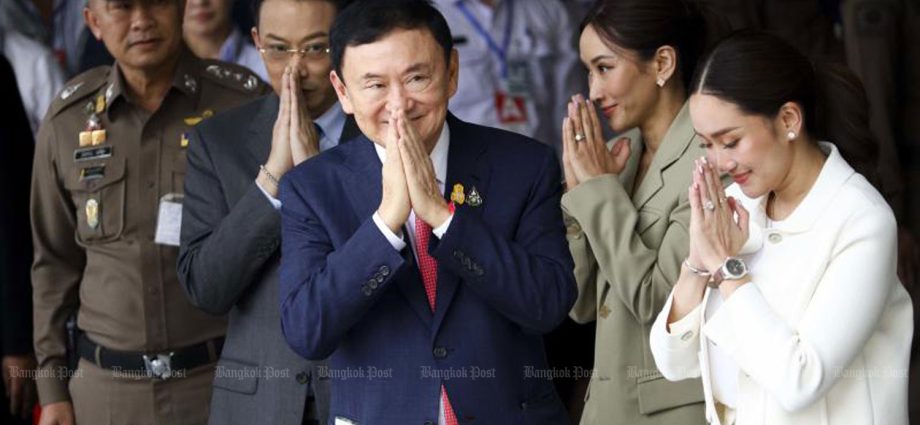Jatuporn Prompan calls on prison and hospital authorities to release video to allay public scepticism

Former red-shirt leader Jatuporn Prompan has joined those demanding the Department of Corrections and Police General Hospital release video to clear up the public’s lingering doubts over the illness of former prime minister Thaksin Shinawatra.
All movements of inmates are monitored by closed-circuit television (CCTV), Mr Jatuporn said. For those who fall ill, all procedures related to their medical treatment and transfers for further treatment are thoroughly recorded.
If Thaksin was suffering from a “political sickness”, it could not be kept secret and the truth would be revealed, he said during a live broadcast of the Thailand First programme on Peace TV, a satellite-based channel on Friday.
“People are raising doubts about whether Thaksin is politically sick or really sick. When he returned to Thailand at Don Mueang airport, key figures from the Pheu Thai Party clearly said during press interviews that Thaksin was in very good health,” said the 57-year-old former chairman of the pro-Thaksin United Front for Democracy against Dictatorship (UDD), or the red shirts.
“But Thai people just learned that he fell sick when he was taken to a prison. The Department of Corrections announced that he suffered four critical diseases — heart disease, lung disease, high blood pressure and a herniated disc. The prison hospital there is very good, able to quickly detect the four diseases with the use of a stethoscope.”
Corrections and hospital authorities have said the 74-year-old prisoner’s multiple health conditions justified the referral to a hospital that is better equipped than the medical facilities at the Bangkok Remand Prison.
Thaksin, 74, was sent to prison following a court appearance on Tuesday, hours after returning home from 15 years of self-exile. He was transferred from the prison to the Police General Hospital at 12.20am on Wednesday after suffering from chest pain, hypertension and low blood oxygen, according to the Department of Corrections.
Pol Lt Gen Dr Sophonrat Singhajaru, the hospital’s chief physician, said on Friday that an echocardiogram and lung tests showed the elderly inmate’s heart and lung conditions were still a concern, while his blood pressure was stable.
But Mr Jatuporn said he wanted to see CCTV images showing Thaksin’s illness as a proof. (Story continues below)

Former prime minister Thaksin Shinwatra and his three children greet supporters as he arrives at Don Mueang airport on Tuesday morning. Less than 18 hours later, he was deemed too ill to be kept in a prison hospital. (Photo: Pattarapong Chatpattarasill)
Lights on 24/7
Recalling his own experience behind bars, he said lights at the prison were turned on around the clock and there was backup power in case of a power outage. More importantly, there were security cameras recording everything. As the number of prison staff was limited, CCTV played a vital role in tracking inmates.
Inmates who are sent to the Police General Hospital must be critically ill, he said. Normally, prison doctors would send sick inmates to the Department of Corrections Hospital first, and doctors there would decide whether to transfer the patient to Police General Hospital or not. These procedures are supposed to apply equally to inmates of all ages, said Mr Jatuporn.
“In Thaksin’s case, doctors might see that his condition is critically ill. But CCTV records everything. There must be footage showing the examination of his symptoms. When being taken to Police General Hospital, CCTV would show the time he left the prison and the time he arrived at the hospital.
If Thaksin was indeed critically ill, he must be admitted to an intensive care unit before being transferred to a patient room on the hospital’s 14th floor, said Mr Jatuporn.
“CCTV footage and images of the care of former prime minister Thaksin, who is critically ill (as claimed), must be shown. This is not confidential because it causes no damage to anyone,” he said.
He said everything involving Thaksin, as an important person serving jail terms, must be recorded. His movements could not be made to disappear from CCTV records.
“If he is really critically ill, nobody opposes any special treatment for him,” he added. “If not, it will be a new problem. There will be intense public scrutiny. Those involved will face mounting pressure from society and they will be end up in jail.”
Mr Jatuporn has recently shocked political observers by launching stinging criticisms of his former party, Pheu Thai, and Thaksin, after years of being one of the former premier’s most ardent loyalists.
He has since accused Thaksin of repeatedly betraying the red shirts, who were his loyal supporters and helped vote his Pheu Thai Party into power.

